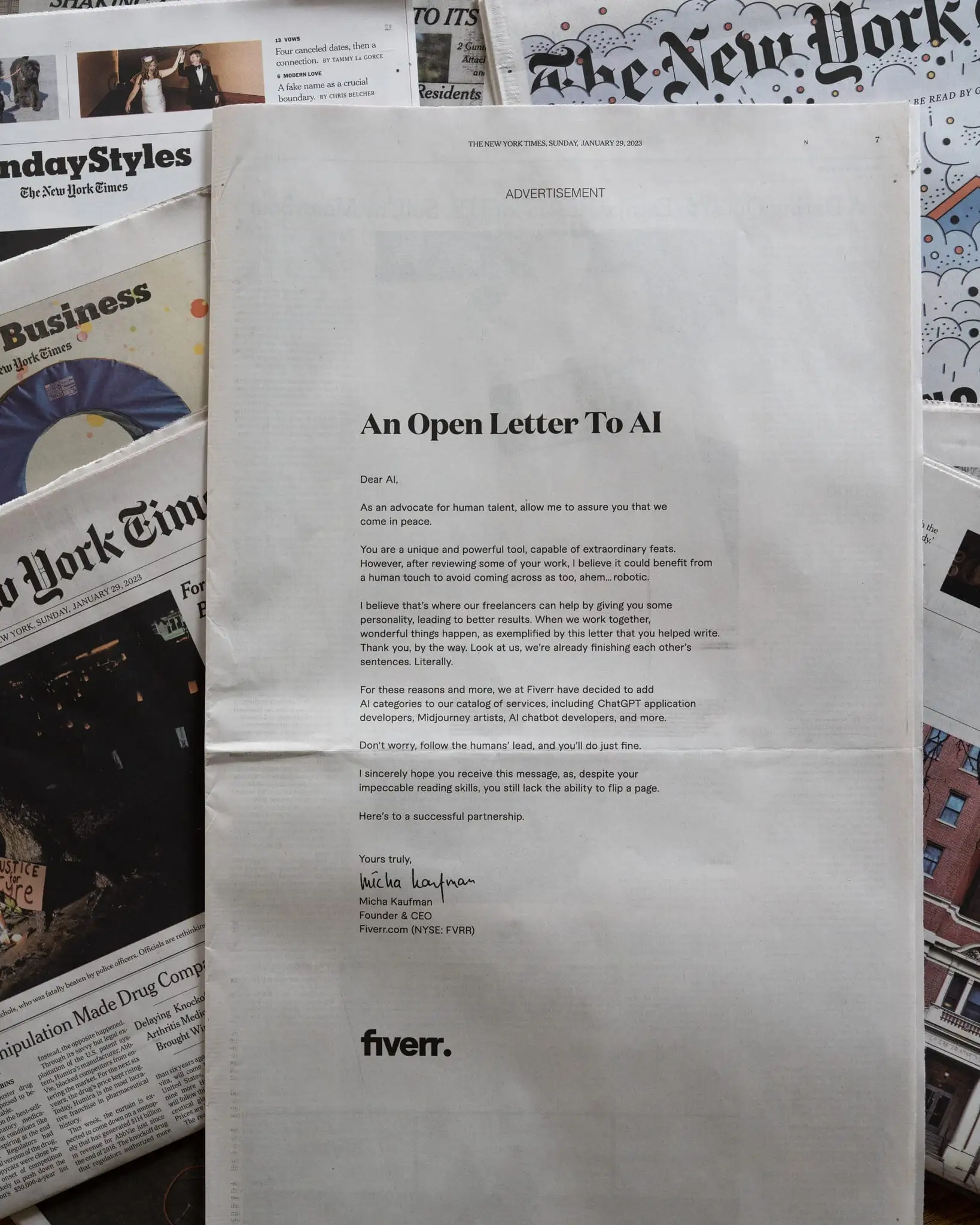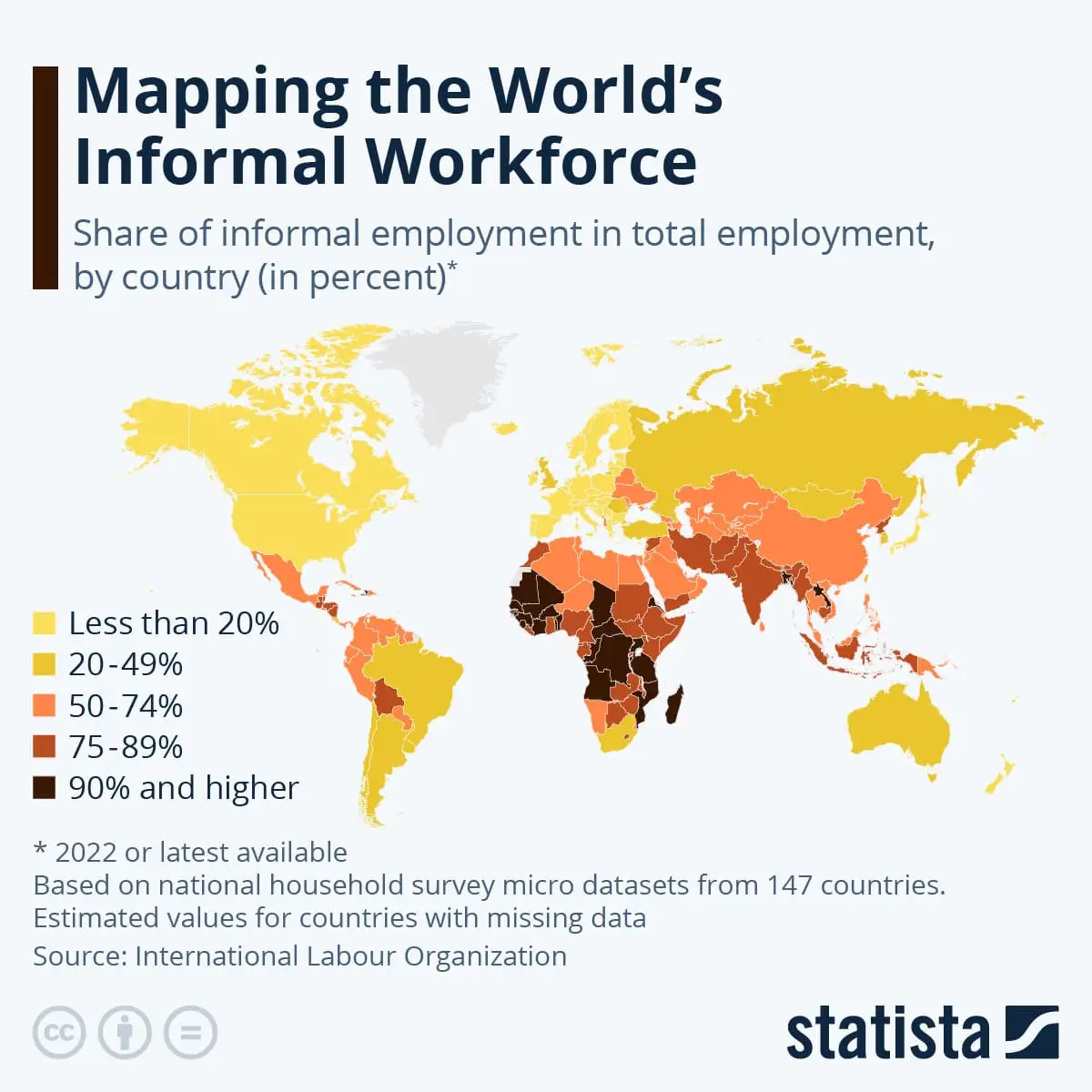The Uncharted Disruption: Generative AI's Impact on Digital Freelancers and the Knowledge Gap

In the last two decades, outsourcing digital work has become a major industry. Companies began shifting bits and pieces of their operations to cheaper labor markets. This led to the development of platforms like Upwork and Fiverr that offer freelancers from around the world for a small fee. One could argue this is a great way to start working in the digital space and a better alternative than low-paying gig work on ride hailing apps like Gojek (Indonesia) or Little (Kenya). All you need is a laptop and you can be part of the international force trying to make a decent wage. Nonetheless, your efforts will be met with fierce competition as more and more advanced AI technologies are developed making things ever tougher for those who depend on these business models.
The digital workforce worldwide is prominently visible on platforms like Fiverr and Upwork, where they engage in intense competition for quality services and prices. Just through casual browsing of offers, or posting a job, one can witness the intensity of this rivalry. I've experimented being a seller on these platforms, and it's not easy. Time is of the essence and clients tend to be favored over sellers at every turn. From what I can see, both Fiverr and Upwork lack any mechanism for authenticating satisfactory quality of work, or any real commitment towards fostering great collaborations—it seems like they prefer ignoring those factors altogether.
I have worked with a variety of developers around the globe who are well-versed in their craft and make decent incomes. However, I'd suggest that most of them cannot make a living due to the overwhelming competition for price cutting. Only the top tier providers on Fiverr, who offer services that are able to be scaled and automated, are able to reach a satisfactory income level by earning more than what they spend on low costs. Unfortunately, this is now largely being outdone by AI algorithms.
In the beginning of 2023, Fiverr's CEO wrote this letter to "AI":
Dear AI, As an advocate for human talent, allow me to assure you that we come in peace. You are a unique and powerful tool, capable of extraordinary feats. However, after reviewing some of your work, I believe it could benefit from a human touch to avoid coming across as too, ahem... robotic. I believe that's where our freelancers can help by giving you some personality, leading to better results. When we work together, wonderful things happen, as exemplified by this letter that you helped write. Thank you, by the way. Look at us, we're already finishing each other's sentences. Literally. For these reasons and more, we at Fiver have decided to add AI categories to our catalog of services, including ChatGPT application developers, Midjourney artists, AI chatbot developers, and more. Don't worry, follow the humans lead, and you'll do just fine. I sincerely hope you receive this message, as, despite your impeccable reading skills, you still lack the ability to flip a page. Here's to a successful partnership.
This letter is an unequivocal surrender - if one examines the stock of Fiverr assignments and gauges its possible replacements by ChatGPTs, it's obvious that many of the 5-dollar job offerings including logo creation, data analysis, voice over tasks, etc. will be rapidly superseded by automated AI.
In the shorter term, ChatGPT will likely help gig workers become more productive with mundane tasks they might have used to do by hand. Longer term, AI will become more advanced, useful, and ubiquitous - meaning mundane tasks previously done for $5 - $10 dollars won't be required. (Source)
According to the Economist, the integration of large language models has led already to a gradual reduction in copywriting prices. This drastic shift creates various implications for freelancers worldwide - they must find new ways to reinvent themselves and focus on tasks that generative AI cannot yet replicate. As a result, many may be resigned to feeding machine learning models to earn a living as mere click workers.
On a positive note, large language models are much more accessible than ever before and continue to become even more so. With various languages gaining dominance and large language models increasingly easy to use through messenger services like Whatsapp, the access barrier is low. That said, some of the best models such as ChatGPTPlus still costs 20 USD per month, and if you want to work with open source ones on your laptop, you need powerful devices. Moreover, these large language models are primarily fed content from the global North, and this won't work with a range of businesses' needs in the global South.

Generative AI such as chatbots with large language models or image generators is having a strong effect on the already meagre income of millions of global freelancers who work in the informal economy, a sector that makes up much more than 50% of economic activity in many countries. These dramatic changes too often go unnoticed by studies which tend to focus mostly on advanced economies. One example is the ILO report “Generative AI and Jobs: A global analysis of potential effects on job quantity and quality” (Paweł Gmyrek, Janine Berg, David Bescond August/2023 ILO Working Paper 96) states that "Generative AI is likely to augment rather than destroy jobs." However, upon closer inspection, it becomes apparent that there is far too little research and reporting done regarding the technical developments and their effects on global digital workers.
This ILO paper did not analyze data for example outsourcing platforms. Instead they took hundreds of standard definitions of job roles and asked, I am not joking, ChatGPT to predict what is the automations potential of each of this roles. "We request GPT-4 to generate a score between 0 and 1, representing potential automation with GPT-based technology for each task in the ISCO task collection and in the GPT-generated set of tasks." ILO researchers feeded chatGPT, that is widely known for its hallucination factor, to predict the automation potential for a research study. "We approach our predicted task-level scores with scepticism. However, following a manual review, at a large scale of 3,123 tasks across all ISCO-08 occupations, we find no evidence of bias in one direction: highly automatable tasks such as typing consistently get a high score (above 0.7), whereas tasks requiring manual dexterity consistently get low scores."
This ILO paper didn't analyze data from outsourcing platforms for example. Instead, they took hundreds of standard definitions of job roles and asked ChatGPT to estimate the automation potential of each role. "We request GPT-4 to generate a score between 0 and 1, representing potential automation with GPT-based technology for each task in the ISCO task collection and in the GPT-generated set of tasks."
"We approach our predicted task-level scores with scepticism. However, following a manual review, at a large scale of 3,123 tasks across all ISCO-08 occupations, we find no evidence of bias in one direction: highly automatable tasks such as typing consistently get a high score (above 0.7), whereas tasks requiring manual dexterity consistently get low scores."
Those knowledgeable about large language models would understand that this prediction lacks real value, as models can't comprehend such tasks fully and using it for research is highly dubious. Additionally, ILO's definitions are based on those from 2008, leaving out many digital workers' job roles.
In conclusion, the advent of ChatGPTs will continue to disrupt the digital freelancer industry globally. Regrettably, only a few studies and reports explore these wide-reaching effects. It increasingly resembles a never-ending cat and mouse game, with AI playing the cat and digital workers around the world acting as the mice.